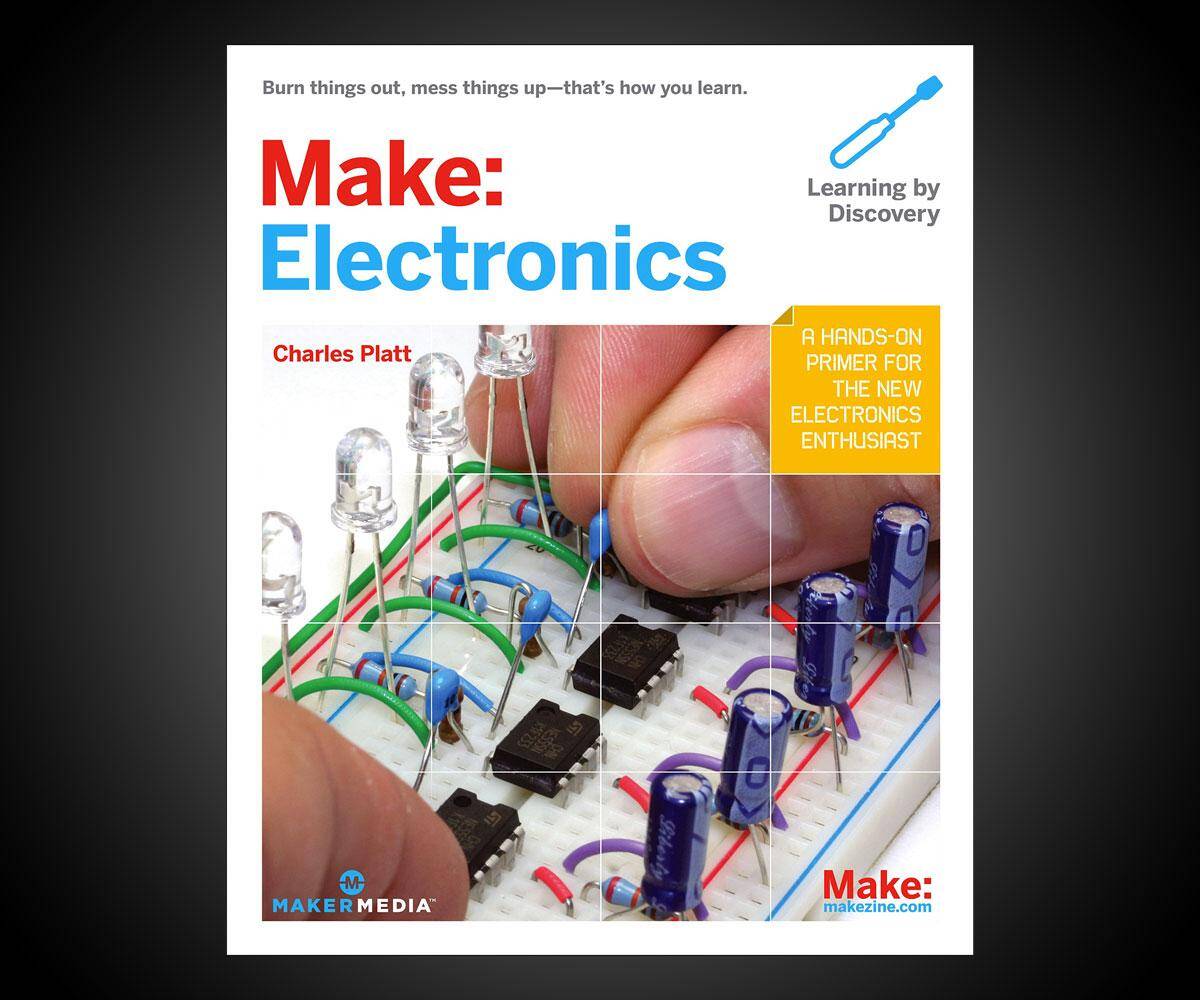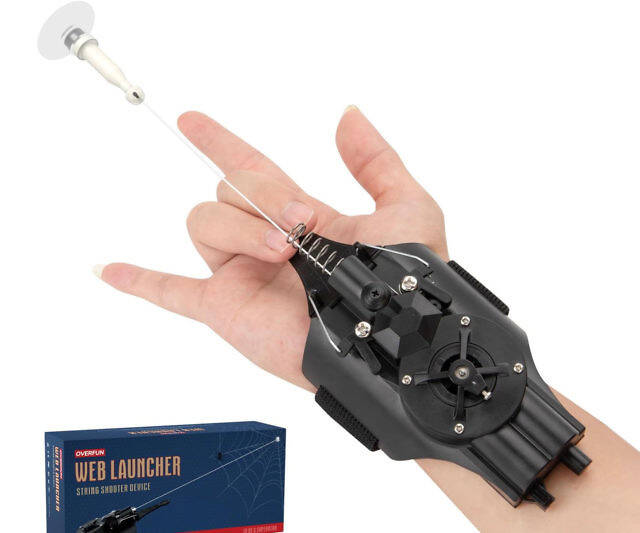Make: Electronics | |||||||||||||
| |||||||||||||
Product Description
"This is teaching at its best!"
--Hans Camenzind, inventor of the 555 timer (the world's most successful integrated circuit), and author of Much Ado About Almost Nothing: Man's Encounter with the Electron (Booklocker.com)
"A fabulous book: well written, well paced, fun, and informative. I also love the sense of humor. It's very good at disarming the fear. And it's gorgeous. I'll be recommending this book highly."
--Tom Igoe, author of Physical Computing and Making Things Talk
Want to learn the fundamentals of electronics in a fun, hands-on way? With Make: Electronics, you'll start working on real projects as soon as you crack open the book. Explore all of the key components and essential principles through a series of fascinating experiments. You'll build the circuits first, then learn the theory behind them!
Build working devices, from simple to complexYou'll start with the basics and then move on to more complicated projects. Go from switching circuits to integrated circuits, and from simple alarms to programmable microcontrollers. Step-by-step instructions and more than 500 full-color photographs and illustrations will help you use -- and understand -- electronics concepts and techniques.
- Discover by breaking things: experiment with components and learn from failure
- Set up a tricked-out project space: make a work area at home, equipped with the tools and parts you'll need
- Learn about key electronic components and their functions within a circuit
- Create an intrusion alarm, holiday lights, wearable electronic jewelry, audio processors, a reflex tester, and a combination lock
- Build an autonomous robot cart that can sense its environment and avoid obstacles
- Get clear, easy-to-understand explanations of what you're doing and why
Features
- Free Shipping on orders over $50
Top Reviews
Good book, reminds me of learning with an actual teacher, some minor to major problems thoughby Kealil (4 out of 5 stars)
January 7, 2014
I'm currently still working through this book but I've already learned a lot. I would say I have at least a beginners grasp of electronics. This books seems to teach you the way an actual teacher or mentor would. Show you an example experiment, tell you whats happening and how, provide extra info, etc. I really like HOW this book works except a couple things.
I think the books main fault is some of the experiments themselves, more like the components needed. When I hit experiment 11 I had to stop for about 3 weeks while I awaited a PUT controller. This part is not on any of the common websites or even sites that the book mentions and I needed 4. I DID eventually find one. it was on amazon and after shipping came to 6.00 a pop. I have a feeling that though the concepts and designs in this book are universal, the actual experiments and parts may need to be updated a bit for modern equivalents.
Also, in an earlier experiment the book had me destroy a $5 relay just to look at the internals. fair warning, dont worry about it. the pictures in the book show the insides just fine
Recommend for any beginner
by john (4 out of 5 stars)
May 17, 2015
I am having a great time reading this book. It is perfect for the beginners looking to get into EE (Electrical Engineering). Maybe by the end of the book you would probably have more hands on experience than a person with a BA degree. I am on the mechanical side of things and it is really easy to follow. If you arent experienced in making or designing things, you MUST do the experiments that are in the book. It is imperative or you will not be able to follow. There is also some important history in this book that is short but worth knowing. Dont buy it with kindle, the format is way off. if you have like an ipad it will work. My kindle is one of the first additions and its almost impossible to understand what it is if you dont know what you are looking at.
Pro:
Well written
To the point
Correct Information
Cons:
Horrible on kindle
I'm learning more here than I did in Electrical Engineering undergrad.
by Blirb (5 out of 5 stars)
October 11, 2013
I have an electrical engineering degree from a top-ranked school. In school, I learned a lot of theory on paper. There were some labs, but the school was more concerned with teaching theory, which is fair enough because there was only so much time for practical experience. I can't say I enjoyed my major too much. I did well, but it was tedious.
This book brings back all the passion I had before I entered undergrad. The book turns the way you learn on its head. You dive right in with your hands making something. Then, you learn the theory AFTER you made something. If you want, you can go off to other sources and learn even more theory, but at least you'll have the foundation of physically feeling what components of the circuit do.
That's how undergrad electrical engineering should be taught (to me anyway). I would have absolutely loved undergrad if that had been the method of teaching. So, here I am, 18 years after graduating from undergrad, and learning more than I did when I was there.
This book will pull you into becoming and electronics hobbyist at its minimum.
by John (5 out of 5 stars)
February 9, 2014
I am enjoying this book very much. After going through the essentials of electricity (and electronics) the book launches with chapters examining electrical component characteristics and then demonstrates how to incorporate that component into a useful circuit that you assemble. The author details the tools and components that you need for each section with pictures and suggested sources and part numbers making it easy to buy what is needed to complete the projects. Be prepared with some cash (or on-line credit) here for getting the components. You can ease yourself into this expense at first and supply the first few chapters for less then $10. Assembly starts by connecting components together with alligator clips then progresses as the schematics become more complex with many components by assembling circuits on a breadboard device designed for experimentation. The experimentation advances into actual soldering of component leads which at this point I assembled a home security system alarm that has functional application. As the author advances your skill, semiconductors are addressed with very well thought out explanation and application and this advances into integrated circuits. This book will pull you into becoming and electronics hobbyist at its minimum or perk your interest into further study into electronic engineering. This book will be excellent for a young experimenter at an age of 12 years or an adventurer of age 80 or grater. No prior knowledge of electricity or electronics are required, you can enjoy this book regardless of your level of understanding of the subject.
Excellent Book for a Budding Engineer and All!
by Shopwithme (5 out of 5 stars)
November 7, 2013
This book is an excellent investment for a budding engineering and anyone learning electronics, young and old alike. This book provides clear and succinct explanation for electronics (ex. diodes, etc). I have engineering and physics textbooks but this book just beats them since the information on electronics is all condensed in this book. I don't have to search online or from one textbook to the next. I have borrowed my nephew's book to help me understand some electronic concept in my textbooks as it is very clear and understandable. This is an excellent reference book for all, whether you are a housewife or student since we interact with electronics in our daily life. It is important that everyone knows the basics of how circuit run and how electricity is dispersed through wiring. This book makes learning electronic so easy. Electronic is not a hard material to grasp, rather it is really pretty simple. One should not think that learning about electricity is a difficult material--it is not! There are projects to accomplish in this book that fit with the topic of discussion. I highly recommend this book for all!
More basic than I was hoping for
by T VZ (4 out of 5 stars)
October 14, 2013
I picked this up with the goal of refreshing my (very) moldy knowledge of electronics. And it's more-or-less suitable for that.
However, the projects in this book are for the most part extremely basic. How to light up an LED, how to burn up a battery -- the really basic stuff eats up a large portion of the book. Don't get me wrong, there are some good projects later on -- latches, buzzers, alarms, a light-seeking robotic cart -- but I would have preferred a faster-paced book with more of these more advanced projects.
Still, it serves its purpose, and it has ample plain-English descriptions of some of the more complex electrical concepts, along with brief interesting tidbits about history. If your goal is to learn from scratch, this is probably a very very good buy for you; if your goal is to refresh prior knowledge, it's probably still a good buy, depending on how much you remember. For me, I have no regrets about buying this book, even if it's not all I hoped for.
This is an excellent book to teach electronics
by Richard J. Weinkauf Jr. (5 out of 5 stars)
November 3, 2014
This is an excellent book to teach electronics. If you have some basic math, science or physics knowledge, you should have no problem progressing through the concepts in this book. Don't let that scare you, I'm talking BASIC knowledge, like the ability to multiply and divide, and you know what an electron is.
I would highly recommend getting the complete electronics kits (Pack 1 and Pack 2) that go with the book if you want to really learn this stuff. They can be a little expensive (about $185.00 from MakerShed when purchased as a complete kit, significantly more expensive if you buy them from Radio Shack). While you can assemble the parts by yourself, or purchase as needed for the chapter you're working on, having both component kits ready to go is really convenient.
Highly recommended
by Jay L (5 out of 5 stars)
January 14, 2015
This is a great book to learn about electronics. It starts at the very basics and gradually you advances through more involved topics.
The one challenge is that it is a "hands-on" kind of book and so to gain full advantage, you will want to purchase all the bits and pieces used in the various examples. The cost for these accessories can add-up to over $100!
I purchased this book because I already had a basic understanding of electronics and wanted to deepen my knowledge. The book has been very useful as it has clarified a number of concepts that I thought that I understood, but later realized that I did not fully grasp.
I would highly recommend this; however, it is very involved and will take a significant investment in time to go through.
Great book
by Malodorous (5 out of 5 stars)
March 16, 2013
I have been working through this book recently and it is really good. It does a lot of things right:
1. Do an experiment, then describe it. Doesn't bore with details when you just want to do something and see results.
2. Part numbers are listed in each chapter. Type these into Mouser and you're set.
3. Sprinkles history lessons into the book without being boring. There are brief sidebar bios about people in electronics, such as the guy who discovered the volt. It's a nice little change of pace and is interesting, not boring like history normally is.
4. The writing style is very easy going and even my children can read this book despite some the subject matter being a few jumps beyond the books they read in school.
This is a very good book for anyone completely new to electronics, or for people who know about circuits and components but aren't experts who can wire robots in their sleep.
Well writen, inspiring, fun. Can't say enough good stuff
by oddtime (5 out of 5 stars)
January 26, 2019
This company puts out some solid material. Each magazine and book, is full of inspiring projects, often of multiple difficulty levels. We need to get more of this stuff into the hands of the "bored kids and adults" in our lives. Learning about electronics is just the start of many future projects. Genius!
Customers Who Bought This Item Also Bought
- How to Diagnose and Fix Everything Electronic, Second Edition
- Getting Started in Electronics
- Practical Electronics for Inventors, Fourth Edition
- Encyclopedia of Electronic Components Volume 1: Resistors, Capacitors, Inductors, Switches, Encoders, Relays, Transistors
- Encyclopedia of Electronic Components Volume 2: LEDs, LCDs, Audio, Thyristors, Digital Logic, and Amplification
- Encyclopedia of Electronic Components Volume 3: Sensors for Location, Presence, Proximity, Orientation, Oscillation, Force, Load, Human Input, Liquid ... Light, Heat, Sound, and Electricity
- Make: More Electronics: Journey Deep Into the World of Logic Chips, Amplifiers, Sensors, and Randomicity
- Make: Electronics: Learning Through Discovery
- Make: Electronics Components Pack 2
- Make: Electronics Component Pack 1 - Follows The 1st ed. (2009) of Make: Electronics Learning Through Discovery by Charles Platt
*If this is not the "Make: Electronics" product you were looking for, you can check the other results by clicking this link








